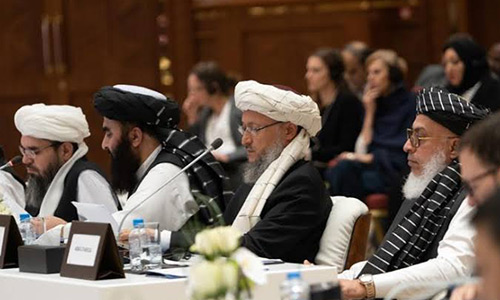The US and Taliban representatives, who have restarted their negotiations in the Qatari capital of Doha, are close to signing a peace deal. However, the talks were held behind closed doors and Afghans have no idea about the content of the agreement. Despite the sporadic optimism and calls, the Afghan government was not included in the US-Taliban talks and the “Afghan-owned” and “Afghan-led” dialogue was not supported.
In addition to holding out hope for ending the 18-year-old conflict, Afghans are likely to be worried about the content of the US-Taliban peace deal.
The Taliban leadership has agreed to reduce violence, but refused to declare truce, which was demanded by Kabul and Washington.
With the Taliban’s refusal to declare truce, it appears that the US-Taliban peace deal will not put an end to the ongoing conflict. Perhaps the main objective of Trump administration is to secure the US troop pullout from Afghanistan through signing a deal with the Taliban leadership even if the deal does not lead to peace and stability in the country.
Afghans are worried that with the marginalization of the Kabul administration and their representatives from the talks, the US-Taliban deal will not result in peace. If the deal does not put an end to the conflict in the country and simply secures the withdrawal of US forces, it will bring no positive outcome to Afghanistan.
The US-Taliban peace deal will include the gradual withdrawal of the US and NATO troops, Taliban’s assurance to end terror sanctuaries, and intra-Afghan dialogue.
The Taliban spokesman in Doha, Suhail Shaheen, is cited as saying that the US-Taliban deal will lead to the start of an intra-Afghan dialogue and negotiations for a nationwide ceasefire. He added, “It’s now a matter of days. We are optimistic that we may be able to sign the agreement latest by this month’s end.”
Meanwhile, Nickolas Kay the NATO Senior Representative for Afghanistan said that a regional consensus was formed in support of the Afghan peace process and added that he was “optimistic about peace talks”. Reiterating the role of regional states, he said, “NATO encourages all regional actors to play a constructive role in stabilizing the region. Like all neighboring countries, Pakistan’s role in supporting the peace process will continue to be crucial.”
The US side is likely to be in a hurry to sign a peace deal with the Taliban for two reasons: For the one, the Trump administration is concerned about the fragility of the deal following the escalating tension between Tehran and Washington. It fears that Iran will seek an opportunity to blow the whistle on the Taliban.
Second, Trump is seeking to show himself victorious in the Afghanistan conflict and a “problem solver” and label his campaign in the US upcoming presidential election with the return of US soldiers.
It is, however, believed that if the US-Taliban deal fails to end the conflict in Afghanistan, Trump will not win the Americans supports in his campaign.
If the content of the US-Taliban peace agreement is not revealed to the Afghan people before the signature, it will mean the total disregard of Afghans in the talks. In short, it will be deciding the fate of Afghan people behind closed doors. With this in mind, Afghans, mainly women, are really concerned about the outcome of the talks and fear the compromise of their rights. Viewing the Taliban with mistrust, Afghans do not believe that the Taliban will practice upon their agreement if there is not international observers.
The fact is that the withdrawal of US forces will embolden the Taliban, who are feared to intensify their attacks after the troop pullout.
It is believed that the most controversial issues of the talks are attributed to be discussed in the intra-Afghan dialogue. If US Special Representative for Afghanistan Reconciliation Zalmay Khalilzad could not have persuaded the Taliban to stop violence and conflict despite the US agreement to withdraw its troops, the Taliban will declare victory. That is, the main objective of the talks, according to general beliefs, is to end the conflict.
Overall, Afghans expect four issues from the US-Taliban peace talks: First, the US should ascertain Afghans’ view regarding the agreement through revealing the content to them. Second, the Taliban should guarantee that Afghans democratic gains and women’s rights and liberties will not be at stake. Third, the international community and global powers have to guarantee the agreement. Forth, the troop pullout should not be conducive to civil unrest and the Taliban have to reduce violence and/or declare truce as a gesture of goodwill for the talks.
Home » Opinion » Afghans’ Concerns over US-Taliban Likely Peace Agreement
Afghans’ Concerns over US-Taliban Likely Peace Agreement
| Hujjatullah Zia

